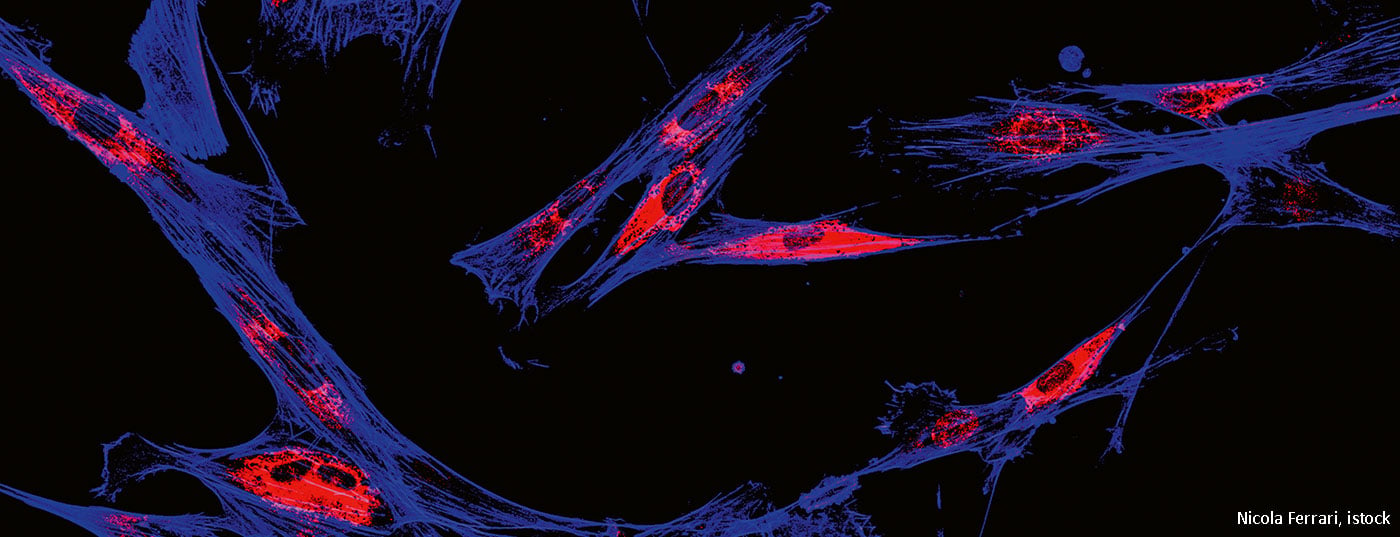Autoimmune reactions are a common side effect of checkpoint inhibitor therapies used to treat melanocytic tumors. As a study published in the New England Journal of Medicine shows, extracorporeal photopheresis can provide relief from these undesirable side effects.
Black skin cancer, also known as melanoma, has only been treatable with medication for a few years. However, one in two patients experiences severe autoimmune reactions such as skin rash or diarrhea. Researchers at the University Hospital of Freiburg, together with Swiss colleagues, have now shown that these can be stopped with a special light therapy. They treated a 29-year-old cancer patient with severe inflammation of the intestinal mucosa very successfully using extracorporeal photopheresis (ECP). In this process, immune cells outside the body are mixed with a light-reactive drug, irradiated with UV light and returned to the body. The procedure is believed to activate immune cells that stop inflammation. Photopheresis therapy resulted in complete resolution of the patient’s symptoms, while ongoing cancer therapy successfully treated the skin cancer. Previous, established treatment approaches had been unsuccessful beforehand. The case description appeared earlier this year in the prestigious journal New England Journal of Medicine. “The patient responded incredibly well to our new therapeutic approach. With extracorporeal photopheresis, we have found an important therapeutic option for him and hopefully for many other patients,” says study leader Prof. Dr. Robert Zeiser, head of the Tumor Immunology Division of the Department of Internal Medicine I (focus: hematology, oncology and stem cell transplantation) at Freiburg University Hospital. “In principle, the therapeutic approach is also conceivable for immune-mediated side effects of other cancer therapies,” Prof. Zeiser said. The effectiveness of ECP was demonstrated by Zeiser’s research group in collaboration with Dr. Frank Meiss and Prof. Dr. Dagmar von Bubnoff, both senior physicians at the Department of Dermatology and Venereology at Freiburg University Hospital, together with Prof. Dr. Burkhard Becher from the Institute for Experimental Immunology at the University of Zurich.
|
NEJM 2020: Apostolova et al. The title of the original article published in the New England Journal of Medicine is “Extracorporeal Photopheresis for Colitis Induced by Checkpoint-Inhibitor Therapy.” Extracorporeal photopheresis is an effective treatment for “graft-versus-host diseases”. Immune cells are mixed with a light-reactive drug outside the body, irradiated with UV light and returned to the body. In the present study, this method was used to alleviate side effects of checkpoint inhibitor therapy for melanoma treatment. The patient had developed severe autoimmunologic colitis as a side effect of immunotherapy. Extracorporeal photopheresis resulted in an increase in the number of immunoregulatory natural killer cells and a decrease in intestinal mucosal inflammation. DOI: 10.1056/NEJMc1912274 |
Substitute for cortisone therapy with many side effects
So-called immune checkpoint inhibitors are used in the treatment of black skin cancer and many other types of cancer. “Cancer cells often have a kind of cloak that makes them invisible to the body’s immune response. Immune checkpoint inhibitors strip them of this cloak and thus enable the immune system to attack the cancer cells,” explains Prof. Zeiser. However, the immune system often also begins to destroy the body’s own structures. These side effects can affect different organs such as the intestine, skin, thyroid, liver or brain. “Until now, patients with such side effects of cancer immunotherapy have usually been treated with cortisone or other immunomodulating agents for a longer period of time, but this does not always work or can have severe side effects,” Zeiser said. In addition, cortisone is suspected of blocking the immune response to the tumor and thus torpedoing cancer treatment.
ECP treatment was repeated in the patient every two to four weeks for eight months. Shortly after the start of therapy, there was a complete reduction in the severe diarrhea caused by inflammation. As the researchers noted, during ECP therapy, a certain type of immune cell became larger and more active. “We assume that these enlarged immune cells act on other parts of the immune system to slow down inflammation,” Zeiser explains. The therapeutic approach also proved safe in preclinical animal models. “Very important for the concomitant therapy was that the ECP treatment had no negative impact on the anti-tumor effect of the immune drugs.”
Source: University Hospital Freiburg (D)











